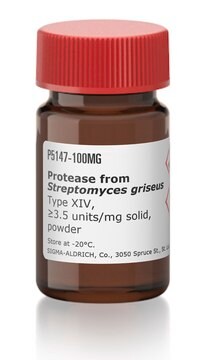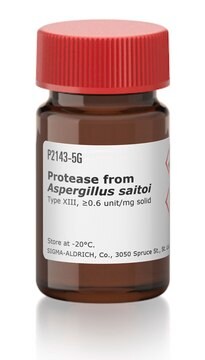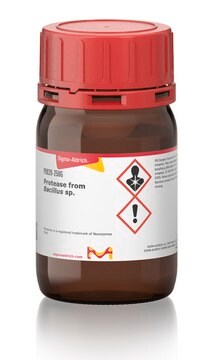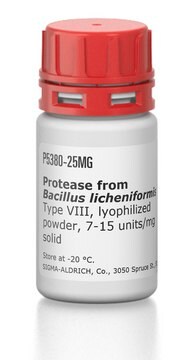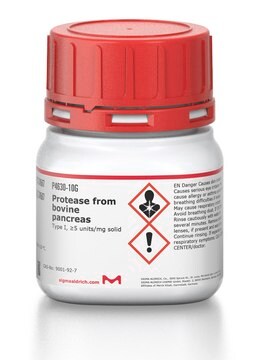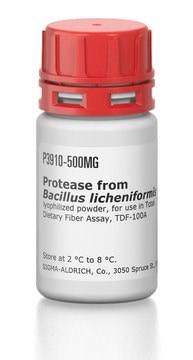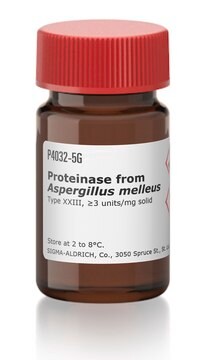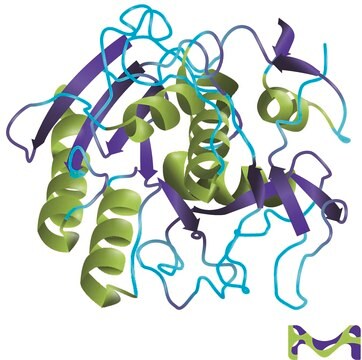P0107
Protease from Rhizopus sp.
Se connecterpour consulter vos tarifs contractuels et ceux de votre entreprise/organisme
About This Item
Numéro CAS:
Numéro MDL:
Code UNSPSC :
12352204
eCl@ss :
32160410
Nomenclature NACRES :
NA.54
Produits recommandés
Description
acidic protease
Niveau de qualité
Forme
powder
Activité spécifique
≥0.2 unit/mg solid
Température de stockage
2-8°C
Vous recherchez des produits similaires ? Visite Guide de comparaison des produits
Catégories apparentées
Description générale
Exhibits both proteolytic and lipolytic activities.
Proteases are proteolytic enzymes that digests the proteins. It is classified into acidic, neutral and alkaline proteases based on their pH optimum. Proteases finds its applications in textile industries, laundry and healthcare. It is also being used in food processing industries such as baking and brewing. Rhizopus chinensis is the key species in the production of aspartate proteinase.
Stable in the acid range of pH 3-5. pH Optimum is 3.0.
Application
Protease from Rhizopus sp. has been used in the enzyme treatment of planted and nonplanted scots pine seedlings.
Protease from Rhizopus spp. Has been used in a study to assess the amino acid sequences near the amino termini using automated Edman degradation. It has also been used in a study to investigate inactivation of the enzyme by reaction with diazoacetyl-DL-norleucine methyl ester in the presence of cupric acetate.
Actions biochimiques/physiologiques
Protease from Rhizopus chinensis can be inhibited by pepstatin.
Définition de l'unité
One unit will hydrolyze casein to produce color equivalent to 1.0 μmole (181 μg) of tyrosine per min at pH 3.0 at 37 °C (color by Folin-Ciocalteu reagent), unless otherwise indicated.
Forme physique
Supplied as a powder containing dextrin as a stabilizer
Mention d'avertissement
Danger
Mentions de danger
Conseils de prudence
Classification des risques
Resp. Sens. 1
Code de la classe de stockage
11 - Combustible Solids
Classe de danger pour l'eau (WGK)
WGK 1
Point d'éclair (°F)
Not applicable
Point d'éclair (°C)
Not applicable
Certificats d'analyse (COA)
Recherchez un Certificats d'analyse (COA) en saisissant le numéro de lot du produit. Les numéros de lot figurent sur l'étiquette du produit après les mots "Lot" ou "Batch".
Déjà en possession de ce produit ?
Retrouvez la documentation relative aux produits que vous avez récemment achetés dans la Bibliothèque de documents.
The amino terminal sequences of acid proteases-human pepsin and gastricsin and the protease of Rhizopus chinensis.
P Sepulveda et al.
Biochemical and biophysical research communications, 63(4), 1106-1112 (1975-04-21)
Characterization of proteases from Rhizopus species after growth on soybean protein
Heskamp ML and Barz W
Zeitschrift fur Naturforschung C, 52(9-10), 595-604 (1997)
Giovanni Caprioli et al.
Journal of chromatography. A, 1217(11), 1779-1785 (2010-02-09)
A new analytical method that uses high performance liquid chromatography-diode array detector (HPLC-DAD) was developed for the analysis of 14 benzimidazoles residues, including metabolites, in bovine liver. Samples were extracted using two different extraction procedures: with phosphate buffer after enzymatic
The structure and function of acid proteases. Specific inactivation of an acid protease from Rhizopus chinensis by diazoacetyl-DL-norleucine methyl ester.
F Mizobe et al.
Journal of biochemistry, 73(1), 61-68 (1973-01-01)
J Marciniszyn et al.
The Journal of biological chemistry, 251(22), 7088-7094 (1976-11-25)
Four derivatives of pepstatin, each of which contains the unusual amino acid 4-amino-3-hydroxy-6-methylheptanoic acid (statine) have been prepared. All four are porcine pepsin inhibitors. Both N-acetylstatine and N-acetyl-alanyl-statine are competitive inhibitors for pepsin with Ki values of 1.2 X 10(-4)
Notre équipe de scientifiques dispose d'une expérience dans tous les secteurs de la recherche, notamment en sciences de la vie, science des matériaux, synthèse chimique, chromatographie, analyse et dans de nombreux autres domaines..
Contacter notre Service technique